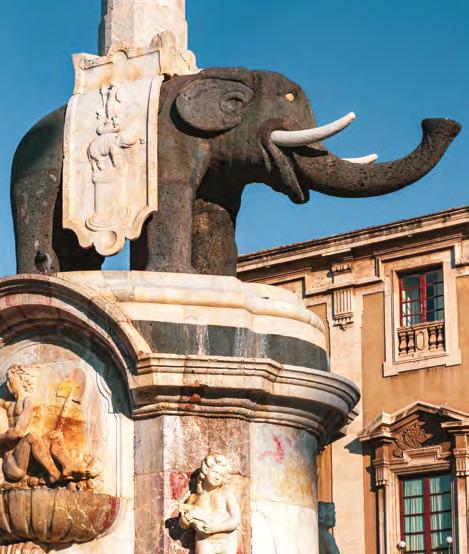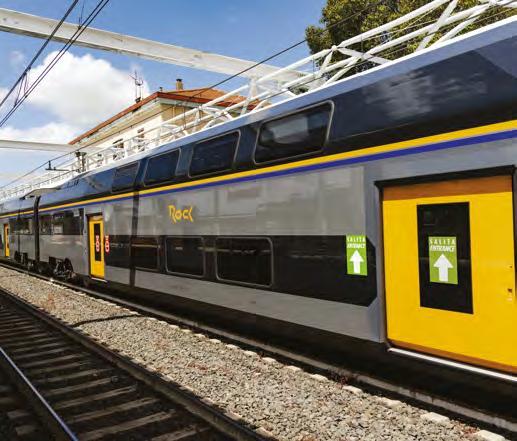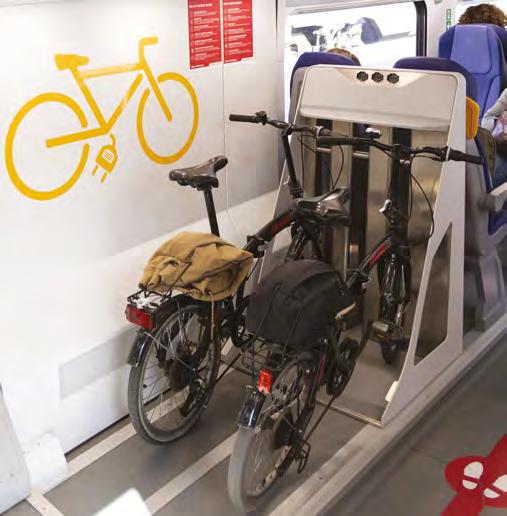
12 minute read
Innovation and sustainable finance as accelerators of change
INNOVATION
Continuous, systemic innovation is a strategic driver for the Group’s strengthening of its leadership positions in the sectors in which it operates. Through innovation, the Group aims to offer increasingly higher quality services tailored to the specific needs of passengers, customers and other stakeholders. Innovation covers every link in the value chain, from design, to construction and maintenance and, finally, to the delivery of safe, integrated, made-to-measure transport services. Faced with a highly uncertain scenario dominated by the pandemic, the FS Italiane Group is even more compelled to rethink and reorganise its services and how it uses the infrastructure, making innovation an accelerator of change. The NRRP provided a huge stimulus by allocating considerable resources to the FS Italiane Group to build and design new railway infrastructure and upgrade existing infrastructure focused on sustainability, accessibility, digitalisation, resilience and interconnection. Ferrovie dello Stato Italiane will play a crucial role in Italy’s revival, not only in the amount of investments it will manage but also and above all in its ability to offer innovative solutions from a technical and sustainability point of view. At the end of 2021, the Group began work on drafting its new 20222031 business plan. In addition to putting the resources allocated by the NRRP to use, it will also give great impetus to making FS’ business more sustainable, digital and integrated. The Group continues to be very active regarding research and innovation activities funded by the European Union through global consortia with over 100 partners including universities, research bodies, industry and sector operators. The portfolio of projects under way in 2021, chiefly focused on multimodal mobility, safety and aerospace technologies for monitoring infrastructure and signalling, received €72.8 million in EU funds over their lifespans, of which roughly €2.5 million allocated to the FS Italiane Group. More specifically, the Group plays an active role in Horizon Europe, the EU’s key funding programme for research and innovation which helps to achieve the UN’s SDGs and boosts the EU’s competitiveness and growth. In addition to activities performed with sector associations and European institutions, the Group was very active in interacting with innovative start-ups and SMEs: over 1,240 from 2018 to 2021. Specifically, while the 2018-2020 three-year period was dedicated to boosting the deal flow of innovative solutions from a quantitative viewpoint, in 2021 scouting was structured in a manner to improve the quality of potentially interesting innovative solutions, in order to increase the success rate of co-innovation projects rolled out as Proof of Concept (PoC). With regard to innovation and sustainability, the Group signed new partnerships with Snam, Eni, Enel and Sapio, focused on the transition to energy from alternative sources (hydrogen, biofuels, LNG, renewable sources), and with Acea
for widespread composting of organic waste in the Group’s areas to boost the circular economy. Furthermore, the Group kept its eye on the innovation ecosystem via various partnerships with leading players including start-up incubators and accelerators, advisers, observers and research centres.
As in the previous year, various open innovation solutions were rolled out in 2021: 3 Call4Ideas & Hackathons, 7 PoCs and various vertical scouting operations to meet the specific business needs of the operating companies. Finally, the network of innovation hubs was expanded further to support FS’ innovation processes. After Rome and Naples, Catania became home to a new hub.
INNOVATION HUB – CATANIA
FS Italiane inaugurated its third innovation hub in Sicily. Following in the footsteps of Rome and Naples, Isola Catania, a space dedicated to digital and energy, was opened in Palazzo Biscari. This is a place where FS Italiane Group - with the priceless contribution of Tree, a company specialised in open innovation and communication - can work on innovative projects and talented individuals, start-ups and companies can meet up and pool their know-how and experience.
® FS Italiane archive

THE GROUP IS OPEN TO THE OUTSIDE WORLD, SEARCHING FOR STIMULI AND PARTNERS FOR INNOVATIVE SOLUTIONS, BUT ALSO LOOKS TO ITS OWN WORLD THROUGH CORPORATE ENTREPRENEURSHIP PROGRAMMES
The second edition of “Innovate” focused on sustainability was held in 2021. Over 3,500 employees actively participated in the programme and five innovative projects run by intercompany teams were proposed via a flexible accelerator programme. The winning project was SafeME: a badge holder for on-board train crew and drivers which enables workers in dangerous situations to make immediate contact with the control room (or emergency officer). The other finalists were: * SPGR - Security Power Augmented Railways: using augmented reality for maintenance, to give operators immediate, contextualised access to all technical information by looking at a device. * TaBii - Battery-powered trains on a hybrid infrastructure: allowing battery-powered trains to partially charge at each halt or stop via a line for electric traction near railway stations; * Smart Railway with IoT: a network of IoT (Internet of Things) devices to monitor the conditions of railway infrastructure (in particular, bridges, viaducts, tunnels, etc.) that detect instability and structural changes in the works in real time.
* Virtual Warehouse: a virtual warehouse filled with 3D models of spare parts that produces spare parts in real time when they are effectively needed.
| SUSTAINABLE FINANCE
Sustainable finance tools are key for the Group in ensuring its sustainability and competitive edge over the medium to long term, with a direct impact on its reputation and its ability to collect funds on the capital market. Recent legislative developments and the growing pressure of public opinion are encouraging collaboration between institutions, the financial sector and businesses to join forces in keeping global warming within the limits of the Paris Climate Agreement and to ensure future generations have the chance to live in a more sustainable world.
The recovery plan, the New Green Deal, EU taxonomy and sustainable finance drive the shift towards a greener continent, to improve personal well-being and achieve carbon neutrality by 2050. Aware of its role in Europe, throughout the country and, especially, in the transport sector, the Group has decided to promote increasingly integrated, inclusive, collective and environmentally-friendly mobility (infrastructure and services). In this context, it has chosen sustainable finance tools to fund all of its projects that help boost the Group’s performance. In addition to requiring the allocation of the proceeds to sustainable projects, sustainable finance increases transparency with stakeholders through reporting on the ways in which the financing is used and its environmental and social impacts. To finance projects with positive impacts in terms of environmental and social sustainability, Ferrovie dello Stato Italiane has developed a Green Bond Framework in line with the Green Bond Principles of the International Capital Market Association (ICMA). The Green Bond Working Committee was set up on 27 March 2018 to implement and update the Green Bond Framework, with specific regard to the identification and assessment of eligible green projects, which includes holding discussions with the counterparties involved in the analysis of the projects’ greenness and the implementation of reporting procedures and management of the proceeds from the bond placements.

ETR 1000
Over the course of the past three years, four green bond23 issues were placed for a total of €2.65 billion. With the first issue in 2017, the Group launched a programme aimed at integrating financing decisions with ESG criteria in line with its business model.
To date, the green bonds have financed the purchase of latest-generation rolling stock for public transport and freight transport, helping to cut emissions from the service.
In particular: * the new regional Pop trains (medium capacity) and Rock trains (high capacity) are equipped with high-energy efficiency technologies (e.g., natural ventilation engines, light alloys, LED lights, sensors for optimal air conditioning, smart parking mode, etc.), cutting CO2 emissions by approximately 20% compared to the other trains in the same market segment. Furthermore, these trains are 92%-96% recyclable, offer more space and charging
stations for e-bikes and are eligible for white certificates (incentives for high-energy efficiency technologies); * the ETR 1000 trains (Frecciarossa 1000), the world’s first high speed train with an Environmental Product Declaration (EPD) as it contains CO2 emissions at just 28 grammes per passenger-km (approximately 20% less emissions than the previous generation ETR 500 train). To date, it is the most silent train with the least vibrations produced in Europe thanks to its reduced aerodynamic resistance. In addition, when its life cycle comes to an end, the materials used in some of its parts are 95% renewable and over 94% recyclable. * the new engines (E494, the most recent model in the TRAXX single-system locomotive family) were designed to reduce energy consumption, vibrations and noise pollution, using new technologies like parking mode and eco-mode (in which consumption
is reduced when, inter alia, loads are light), a dynamic braking system (that recovers the energy generated by braking) and a latest-generation air conditioning system. The new wagons also boast technological features that improve safety (electronic sensors to prevent accidents) and reduce energy consumption (they are approximately 1,400 kg lighter). FS Italiane became the first company in Italy to be certified by the Climate Bonds Initiative - a non-profit organisation that promotes sustainable finance around the world as a way of combating climate change. Demonstrating the Group’s interest in using sustainable financial instruments to support investments that reduce the environmental impact of its sector, it has reached a green bond ratio24 of 39% and a green debt ratio25 of 23%. The Group placed two green bond issues in 2021:
23) The documentation is available at the following address: https://www.fsitaliane.it/content/fsitaliane/it/investor-relations/debito-e-credit-rating/green-bond-framework.html.
ROCK POP
* the Group placed its third green bond issue in March for a nominal amount of €1 billion and seven year maturity. The total orders amounted to roughly €1.75 billion from approximately 90 investors, with huge demand in Italy and around 35% from abroad.
Approximately 75% of the orders allocated came from ESG investors committed to sustainability issues. All of the projects funded by green bonds ensure improvements to energy efficiency, reduced CO2 emissions and modal shift towards trains. The funds were used to purchase Pop and
Rock regional trains (roughly 80% of the total) and high speed ETR 1000 trains, some of which were used in Spain for the first time; * the Group placed its fourth green bond issue in the second half of
December for a nominal amount of €350 million subscribed as a private placement by the European Investment Bank (EIB), which funded Trenitalia’s purchase of trains for the high speed lines in Italy and Spain. These were the first green bonds purchased by the EIB under its Green Bond
Purchase Program. The project helps expand the high speed network and transport on the
Trans-European Transport Network (TEN-T) in Italy and Spain, fostering a single railway market and shifting road and air traffic to the railways in line with the
EU’s 4th Railway Package. In addition to the green bonds, the Group also used other sustainable finance tools in recent years; specifically: * a green loan from Unicredit to purchase new Frecciargento electric trains for passenger transport in line with the European Taxonomy criteria; * private bond placement to purchase new trains for public transport, in line with European
Taxonomy criteria, funded via the Eurofima green bond programme; * a climate action loan from the
European Investment Bank to purchase new hybrid trains for regional transport; * a sustainability-linked revolving credit facility (RCF).
24) The total amount of outstanding green bonds (at year end) divided by the total amount of outstanding bonds (five-year moving average) as per the “Commission guidelines on non-financial reporting: guidelines on reporting climate-related information” issued by the European Commission on 20 June 2019). 25) The total amount of outstanding green debt instruments (at year end) divided by the total amount of outstanding debt (five-year moving average) as per the “Commission guidelines on non-financial reporting: guidelines on reporting climate-related information” issued by the European Commission on 20 June 2019.
FS Italiane agreed the new threeyear RCF in June 2021 for an amount of €2.5 billion as the Group’s first sustainability-linked product. Under the terms of the RCF, the margin and commitment fees are revised when the Group reaches targets related to the four key performance indicators that act as a snapshot of its commitment to various ESG (Environmental, Social & Governance) issues. The targets are as follows:

® Trenitalia archive
ESG TARGETS
GENDER GAP AMONG MANAGEMENT Closing the gender gap by increasing the number of women in managerial positions
ESG RATING Improving the Group’s sustainability profile according to the ratings agency Moody’s ESG Solutions methodology EASY STATIONS Increasing the number of actions to eliminate architectural barriers at stations to give all passengers full autonomy while travelling (raising platforms, installing lifts and tactile walkways) INTEGRATED MOBILITY Increasing the number of spaces for bicycles available on the regional train fleet in Italy, to boost the modal shift towards collective and shared mobility
The table below provides an update on the ESG targets of the sustainability-linked RCF26:
As shown above, the initial results attained are in line with the commitments made (ensuring that FS will enjoy the financial benefits gained from more favourable financial conditions of the RCF) and demonstrate the key role that the Group intends to fill in developing safe, integrated and sustainable mobility. These priority objectives for FS and Italy will be monitored and measured annually for the next two years until the RCF expires in 2024. KPI MEASUREMENT UNIT BASELINE 2021 TARGET 2021 ACTUAL STATUS
ESG rating – Moody’s ESG Solutions (formerly Vigeo Eiris)
Gender gap27 score 52 54 64
% 27.5 n.a. 29.7
Easy station
Actions no. 605 ≥730 759
Tactile walkways
Integrated mobility km 53 ≥60 72
Bicycle spaces no. 5,050 ≥ 5,500 5,711
Target achieved; Target in the process of being achieved.
26) See the “ESG rating and other awards” section for more details on the target related to improving the Group’s sustainability profile according to the ratings agency Moody’s ESG Solutions methodology. 27) The target has been spread over the next two years, starting from 2022. The scope of the analysis includes the following companies: FS SpA., RFI, Trenitalia, Ferservizi, Italferr, FS Sistemi Urbani (net of personnel seconded to Metropark), Mercitalia Logistics, Mercitalia Rail, Mercitalia Intermodal, Busitalia Veneto, Busitalia Rail Service, Busitalia Campania, Grandi Stazioni Rail, Grandi Stazioni Immobiliare, Terminali Italia, Italcertifer, Nugo, FS Technology and Cremonesi Workshop.









